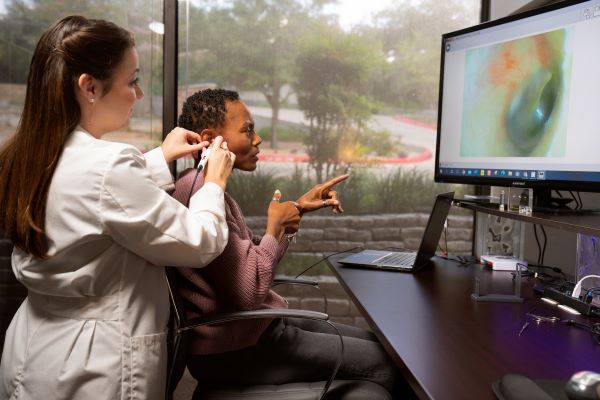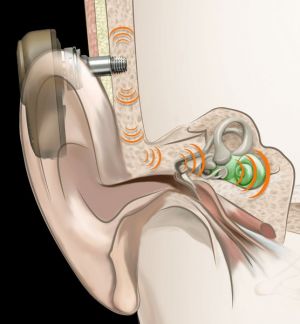Key points:
-
For most people, hearing loss is permanent.
-
In rare cases, surgery or medication can reverse hearing loss.
-
Be wary of any alternative medicines or supplements that claim to treat hearing loss.
-
Hearing aids, cochlear implants or bone-anchored hearing systems are usually the best solutions for hearing loss.
Living with hearing loss can be frustrating and affect your quality of life in unexpected ways. Everyday activities—listening to the TV, making phone calls, chatting with friends—suddenly become exhausting as you spend more and more time trying to figure out what people are saying.
Maybe that's why we get so many questions about whether or not there is a cure, or a way to quickly and easily restore or repair hearing levels to normal, especially for sensorineural hearing loss.

hearing loss, and the best treatments.
The reality: Fully fixing or restoring hearing loss is only possible in very limited cases.
Why it's often permanent
Most adults lose their hearing slowly, over time, due to aging and noise damage. The delicate hair cells in the ear, which detect sound, are permanently degraded or damaged.
Are there any drugs that fix age-related hearing loss?
Unfortunately no drugs are available to treat hearing loss related to aging or noise exposure.
Steroids for sudden hearing loss
For people who experience sudden hearing loss, steroids injected into the ear (or taken orally) can treat inflammation. If given promptly, steroids can sometimes help a person regain their hearing fully.
Alternative remedies for hearing loss
Alternative medicine is big business in the U.S. These days, essential oils in particular have been touted as "natural" remedies for everything from anxiety and depression to allergies and the flu virus. We have even seen some claims about essential oils that help hearing loss and tinnitus. The research doesn't bear this out.
We've also looked into the claims that acupuncture might help hearing loss. After reviewing the research, we found little to indicate acupuncture will restore lost hearing. It may reduce anxiety, though, which is important for people with tinnitus. One remedy that does have some evidence behind it? CBD oil. While the studies were small and preliminary, researchers found that CBD oil may help with tinnitus relief.

surgery to implant a metal device into
the mastoid bone behind the ear.
Surgeries for hearing loss
In some cases, surgery may help improve hearing but they are rarely considered a first-line treatment in adults with mild to moderate hearing loss. Common surgeries performed on the ears include:
Cochlear implants
A cochlear implant is a surgery for adults, and, more commonly, children who have no, or very little, residual hearing. It works by bypassing a severely damaged cochlea to send electrical impulses to the hearing nerves that can be translated by the brain as meaningful sound. If you have significant hearing loss, you may wonder if you can just skip hearing aids and go right to an implant. Before someone (who still has some hearing) can be considered a candidate, they must have tried hearing aids without success.
Good news: Seniors can get cochlear implants, too.
Bone-anchored hearing systems
Bone-anchored hearing systems, also called BAHAs, are surgically implanted devices. They're typically used for people who have hearing loss in one ear, or who have outer ear or ear canal malformations, such as microtia. Surgery involves implanting a small metal device into the mastoid bone behind the ear. After the area has healed, the ENT or an audiologist fits the wearer with a device similar to a hearing aid hat fits snugly over the bone implant. This devices converts sound to vibrations, which stimulate sound waves in the inner ear via the implant.
Stapedectomy
Conductive hearing loss can result from the tiny bones of the middle ear becoming immobile and ineffective for transmitting sound to the inner ear. Otosclerosis is a common reason this can happen, and it results from extra bone material forming around the footplate of the stapes, the innermost bone of the middle ear. A stapedectomy is a procedure in which the stapes is replaced with a prosthesis. This surgery is reserved for specific medical conditions that create conductive hearing loss and is not used for sensorineural hearing loss.
Insertion of middle ear tubes
Considered a minor surgery, this outpatient procedure can be done right in the ENT's (otolaryngologist) office. Middle ear, or pressure equalization (PE) tubes, are used to alleviate pressure buildup behind the eardrum in cases of middle ear infection or fluid that cannot drain through the eustachian tubes. This surgery isn't used to restore hearing per se, but it does help relieve fluid buildup that may be causing temporary hearing loss.
Children are the most common candidates for PE tubes because their not-yet-developed ear anatomy makes ear infections more prevalent than in adults. Middle ear infections and fluid buildup usually cause some temporary conductive hearing loss that will improve post-surgery.
Ready for hearing aids?
For most people, hearing better can be as simple as visiting a hearing care professional and being professionally fit with the right type of hearing aid. While they require more of an adjustment period than eyeglasses, they are effective at amplifying the sounds you struggle to hear, as long as you wear them consistently so your brain can adapt.
If you suspect you have hearing loss and need help, find a clinic in our directory and make the call.
The above is the interpretation of Can Hearing Damage Be Reversed? What's Possible provided by Chinese hearing aid supplier Shenrui Medical. Link https://www.srmcm.com/Blog/Can_Hearing_Damage_Be_Reversed_What_s_Possible.html of this article is welcome to share and forward. For more hearing aid related information, please visit Blog or take a look at our Hearing aids products















